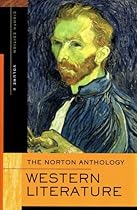
My reading of Mrs. Dalloway and my plan to continue with the Woolf in Winter read-a-long inspired me to look up Ms. Woolf in my trusty Norton anthology. I read the introduction and overview, and then read her essay Modern Fiction. In it, she explains her thoughts on, obviously, modern fiction. She talks about her writing style and the progress of writing fiction. In what written in 1925, the same year as Mrs. Dalloway. I don't normally post quotes, because I'm not really a quote person for some reason, but there were a few passages I found especially interesting.
"Examine for a moment an ordinary mind on an ordinary day. The mind receives a myriad impressions - trivial, fantastic, evanescent, or engraved with the sharpness of steel." That's a perfect little summary of what she does in Mrs. Dalloway.
"[I]f he could write what he chose, not what he must, if he could base his work upon his own feeling and not upon convention, there would be no plot, no comedy, no tragedy, no lover interest or catastrophe in the accepted style...Is it not the task of the novelist to convey this varying, this unknown and uncircumscribed spirit, whatever aberration or complexity it may display, with as little mixture of the alien and external as possible?" Again, she gives a good description of what she's trying to do with Mrs. Dalloway, and what I have heard she goes even further with in To the Lighthouse. Mrs. Dalloway doesn't have a plot in the traditional sense, and Woolf does convey the story through a series of thoughts, allowing us to judge and connect with the characters based on their thoughts, instead of their actions alone. I think that's part of why there are such strong reactions on both ends of the spectrum for the various characters. You are in their heads, you know their thoughts, so that helps you understand why someone does something you don't like, and you can justify liking someone whose actions you don't care for because you know where they are coming from. Conversely, a character might not do anything you don't like, but you may not like them from their thoughts.
"Mr. Joyce is spiritual; he is concerned at all costs to reveal the flickerings of that innermost flame which flashes its messages through the brain, and in order to preserve it he disregards with complete courage whatever seems to him adventitious, whether it be probability, or coherence, or any other of these signposts which for generations have served to support the imagination of a reader when called upon to imagine what he can neither touch nor see." Well, that explains why Joyce is difficult to read! I've read The Portrait of the Artist as a Young man twice, once in high school where I hated it and once in college. The first time, it was the first modernist piece of literature I had read. The lack of "signposts" challenged me greatly, and I couldn't understand why someone would write that way. The second time around, my college professor did a much better job of setting up modernism and as I already knew what to expect and was a more experienced reader, I actually ended up enjoying it. I plan to attempt Ulysses at some point, but haven't been brave enough yet. It's funny that Woolf mentions having read Portrait, and that his latest work, Ulysses, "promises to be a far more interesting work."
"'The proper stuff of fiction' does not exist; everything is the proper stuff of fiction, every feeling, every thought; every quality of brain and spirit is drawn upon; no perception comes amiss." I am glad that I read Mrs. Dalloway for the first time after having come to accept this, because I think that allowed me to enjoy it more. It also made me more likely to read other modernists, because it gave me a focal point other than Joyce and Nathanael West (who I'm not sure is technically a modernist).
No comments:
Post a Comment